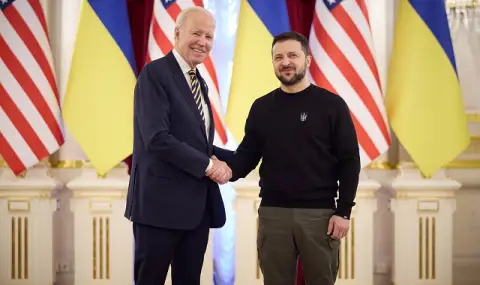Ukraine is opening a small office in Washington, D.C., to strengthen ties with the U.S. defense industry, Ukrainian officials said yesterday at the opening of a NATO summit in Washington, as it and many European countries increase their own weapons production capacity as a precaution against the presidential vote in November.
Whether Joe Biden or former President Donald Trump wins the U.S. presidential election, NATO and Ukraine are moving quickly to be in a better position to provide more for their own defense needs.
The announcement of the office was one of several steps toward new weapons for Ukraine and toward a general agreement among European NATO members to become stronger in the field of defense.
Before Russia's invasion in 2022, Oleksandr Kamyshin, Ukraine's Minister of Strategic Industries, worked on his farm. "I was a happy Ukrainian who was engaged in agriculture and knew nothing about military matters," Kamyshin said. In 2021 Ukraine was not producing any ammunition and started the conflict with the stockpiles it had on warehouse shelves, he added.
That is changing rapidly as Ukraine develops a sophisticated drone industry, produces more weapons for the domestic market and works to deepen its ties with defense companies in the United States and Europe.
"We are retraining from an agricultural country to an arsenal of a different world," Kamyshin said.
Earlier yesterday, U.S. President Joe Biden announced another major aid package for Ukraine's air defense, and outgoing Secretary General Jens Stoltenberg announced that NATO had signed a contract worth nearly $700 million. dollars for member states to produce more "Stinger" missiles.
"We cannot ensure strong defense without a strong defense industry," Stoltenberg said while announcing the contract for the "Stinger" missiles.
"Stinger" is a portable air defense system that can be carried on the shoulder of soldiers or mounted on a vehicle and used to defend against aircraft at short distances.
The system, manufactured by the American company "Raytheon", was one of the first weapons the United States sent to Ukraine after Russia's invasion in 2022. It is now among hundreds of types of systems and tens of millions of shells, artillery ammunition and missiles that member states have removed from their warehouses to help Ukraine. But the rapid escalation of the past two years has revealed that defense firms in both the United States and Europe are not prepared to produce at the levels needed for a major conventional war.
The NATO summit is also taking place against a backdrop of uncertainty. Political disagreements in the US have delayed the delivery of weapons to Ukraine for months, and the upcoming presidential election has raised concerns that US support - with weapons and troops - in the event of threats against member states may not always be guaranteed.
Donald Trump, the presumptive Republican nominee, boasted during campaign speeches that he would encourage Russia to do whatever it wants with NATO members that do not meet their commitment to spend 2% of their gross domestic product on defence.
Kamyshin, who spoke last night at an evening event on the EU defence industry organised by the Hudson Institute in Washington, said that the growth of their defence industry should put them in a stronger position regardless of who wins the US election.
"The defence industry should be strong regardless of the party choices", Kamyshin said. "But I hear Republicans are also advocating for the defense industry," he added.
This isn't just about Ukraine. In the United States and across Europe, some defense production lines were at a standstill during the 2022 invasion and are only now ramping up production capacity. The ramp-up depends on signing new, longer-term contracts that support more capital investment in the necessary infrastructure.
"This isn't about displacement or disruption. This is about building new plants," said Morten Brandtsaeg, CEO of Nammo, a Norway-based ammunition company.
The war has also prompted NATO members to increase their defense spending. Twenty-three of the 32 NATO members are expected to meet the 2 percent commitment this year, up from just six before Russia’s invasion of Ukraine. That is still considered insufficient, while Russia is using its vast manpower to quickly replace weapons lost in the war.
"If you want to wage war for a long time, you need to have an industry behind you that has long-lasting capacity," Brandtsaeg said.
Estonian Defense Minister Hanno Pevkur told the country’s chamber of commerce that Russia now spends about 7-9 percent of its gross domestic product on defense. Estonia spends more than 3 percent of its gross domestic product on defense, but needs to do more to replenish its stockpiles, Pevkur said.
Polish Defense Minister Władysław Kościąg-Kamiś, who is also deputy prime minister, said his country would spend at least 4 percent of its gross domestic product on defense this year. The war in Ukraine "has exposed major weaknesses in Poland, in the region and in the world as a whole," Kościąg-Kamiś said.
Since the invasion, the United States has provided Ukraine with more than $53.6 billion in weapons and security assistance. That support, at a time when the United States is also sending weapons to Israel and Taiwan, has strained U.S. stockpiles. Other NATO members and other international partners have provided a total of about $50 billion. dollars for weapons and security assistance, according to the Kiel Institute for the World Economy, an independent research organization based in Germany.
White House National Security Adviser Jake Sullivan said at the summit last night that for the first time in history, NATO member states would commit to drawing up plans to strengthen their own defense industrial capacity. He said this would help the alliance "prioritize the production of the most important defense equipment that we would need in the event of a conflict".
NATO's 32 different member states have vastly different sizes and capabilities of their defense industries, so each country's plan could vary widely, from partnerships with industry to partnerships with other countries.
Translation from English: Svetoslav Tanchev, BTA
